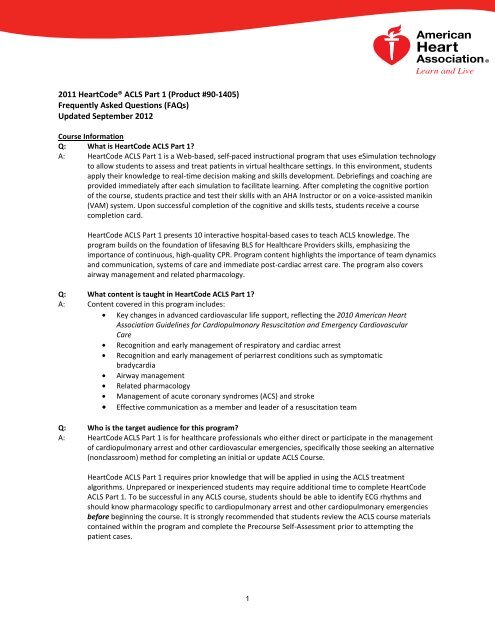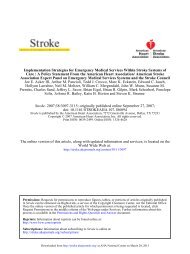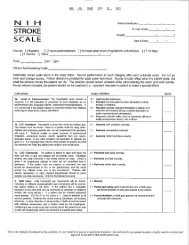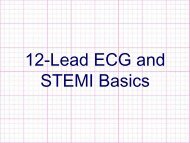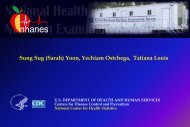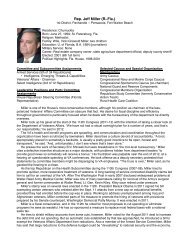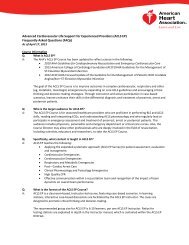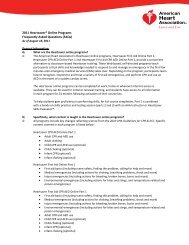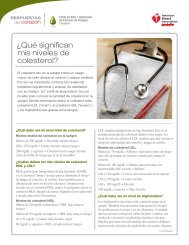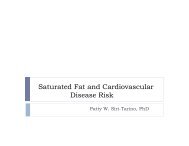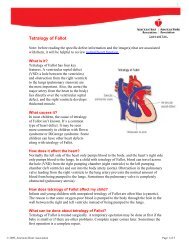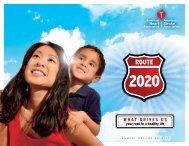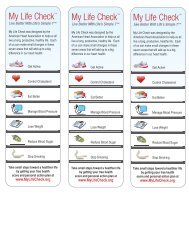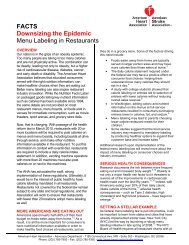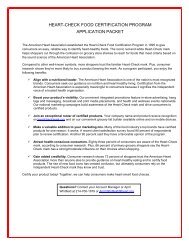2011 HeartCode ACLS Part 1 - American Heart Association
2011 HeartCode ACLS Part 1 - American Heart Association
2011 HeartCode ACLS Part 1 - American Heart Association
Create successful ePaper yourself
Turn your PDF publications into a flip-book with our unique Google optimized e-Paper software.
<strong>2011</strong> <strong><strong>Heart</strong>Code</strong>® <strong>ACLS</strong> <strong>Part</strong> 1 (Product #90-1405)<br />
Frequently Asked Questions (FAQs)<br />
Updated September 2012<br />
Course Information<br />
Q: What is <strong><strong>Heart</strong>Code</strong> <strong>ACLS</strong> <strong>Part</strong> 1?<br />
A: <strong><strong>Heart</strong>Code</strong> <strong>ACLS</strong> <strong>Part</strong> 1 is a Web-based, self-paced instructional program that uses eSimulation technology<br />
to allow students to assess and treat patients in virtual healthcare settings. In this environment, students<br />
apply their knowledge to real-time decision making and skills development. Debriefings and coaching are<br />
provided immediately after each simulation to facilitate learning. After completing the cognitive portion<br />
of the course, students practice and test their skills with an AHA Instructor or on a voice-assisted manikin<br />
(VAM) system. Upon successful completion of the cognitive and skills tests, students receive a course<br />
completion card.<br />
<strong><strong>Heart</strong>Code</strong> <strong>ACLS</strong> <strong>Part</strong> 1 presents 10 interactive hospital-based cases to teach <strong>ACLS</strong> knowledge. The<br />
program builds on the foundation of lifesaving BLS for Healthcare Providers skills, emphasizing the<br />
importance of continuous, high-quality CPR. Program content highlights the importance of team dynamics<br />
and communication, systems of care and immediate post-cardiac arrest care. The program also covers<br />
airway management and related pharmacology.<br />
Q: What content is taught in <strong><strong>Heart</strong>Code</strong> <strong>ACLS</strong> <strong>Part</strong> 1?<br />
A: Content covered in this program includes:<br />
• Key changes in advanced cardiovascular life support, reflecting the 2010 <strong>American</strong> <strong>Heart</strong><br />
<strong>Association</strong> Guidelines for Cardiopulmonary Resuscitation and Emergency Cardiovascular<br />
Care<br />
• Recognition and early management of respiratory and cardiac arrest<br />
• Recognition and early management of periarrest conditions such as symptomatic<br />
bradycardia<br />
• Airway management<br />
• Related pharmacology<br />
• Management of acute coronary syndromes (ACS) and stroke<br />
• Effective communication as a member and leader of a resuscitation team<br />
Q: Who is the target audience for this program?<br />
A: <strong><strong>Heart</strong>Code</strong> <strong>ACLS</strong> <strong>Part</strong> 1 is for healthcare professionals who either direct or participate in the management<br />
of cardiopulmonary arrest and other cardiovascular emergencies, specifically those seeking an alternative<br />
(nonclassroom) method for completing an initial or update <strong>ACLS</strong> Course.<br />
<strong><strong>Heart</strong>Code</strong> <strong>ACLS</strong> <strong>Part</strong> 1 requires prior knowledge that will be applied in using the <strong>ACLS</strong> treatment<br />
algorithms. Unprepared or inexperienced students may require additional time to complete <strong><strong>Heart</strong>Code</strong><br />
<strong>ACLS</strong> <strong>Part</strong> 1. To be successful in any <strong>ACLS</strong> course, students should be able to identify ECG rhythms and<br />
should know pharmacology specific to cardiopulmonary arrest and other cardiopulmonary emergencies<br />
before beginning the course. It is strongly recommended that students review the <strong>ACLS</strong> course materials<br />
contained within the program and complete the Precourse Self-Assessment prior to attempting the<br />
patient cases.<br />
1
Q: What is the format of this program?<br />
A: Using eSimulation technology, <strong><strong>Heart</strong>Code</strong> <strong>ACLS</strong> <strong>Part</strong> 1 presents 10 adult patient cases with up to four<br />
healthcare providers, including one BLS case; seven cases representing cardiovascular, respiratory and<br />
stroke emergencies; and two Megacodes. Students assess and treat patients virtually and receive<br />
real-time debriefing and coaching. The program also teaches critical concepts and knowledge through<br />
videos.<br />
To receive an <strong>ACLS</strong> course completion card using this program, students must complete three parts:<br />
• <strong><strong>Heart</strong>Code</strong> <strong>ACLS</strong> <strong>Part</strong> 1. Upon successful completion of the online portion, including the<br />
written exam, students receive a <strong>Part</strong> 1 certificate of completion, which must be presented<br />
for parts 2 and 3<br />
• <strong>Part</strong> 2*, a hands-on skills practice session with an AHA <strong>ACLS</strong> Instructor or using a voiceassisted<br />
manikin (VAM) system<br />
• <strong>Part</strong> 3*, a skills test with an AHA <strong>ACLS</strong> Instructor or using a VAM system<br />
*<strong>Part</strong>s 2 and 3 should be completed in one “skills practice and testing” session.<br />
Q: What are some of the features of <strong><strong>Heart</strong>Code</strong> <strong>ACLS</strong> <strong>Part</strong> 1?<br />
A: Course features include:<br />
• Self-paced and accessible 24 hours a day<br />
• Ten interactive, hospital-based patient scenarios, using eSimulation technology<br />
• Precourse Self-Assessment to gauge students’ knowledge and application of ECG recognition and<br />
pharmacology<br />
• Debriefings and coaching provided immediately after each simulation, with hyperlinks to the<br />
referenced section of the <strong>ACLS</strong> Provider Manual<br />
• Team dynamics lesson reinforces critical concepts for communication and effectiveness<br />
• Emphasis on effective code team leader skills<br />
• Multiple choice, 50-question exam to test cognitive knowledge; program immediately identifies<br />
incorrect answers and provides a hyperlink to the appropriate section of the <strong>ACLS</strong> Provider<br />
Manual for instant remediation<br />
• Certificate of completion available to print when <strong>Part</strong> 1 has been completed successfully<br />
• Online access to the <strong>ACLS</strong> Provider Manual, the 2010 AHA Guidelines for CPR and ECC and the<br />
2010 Handbook of Emergency Cardiovascular Care for Healthcare Providers<br />
• Provides access to all information in course for 24 months (two years) following activation of<br />
course key<br />
• Provides up to 10.25 hours continuing education credit<br />
Q: Approximately how long does <strong><strong>Heart</strong>Code</strong> <strong>ACLS</strong> <strong>Part</strong> 1 take to complete?<br />
A: <strong>Part</strong> 1 can be completed in approximately 10 hours; however, unprepared or inexperienced students may<br />
require additional time. Also, the time to complete may be longer if students are using the program at a<br />
location where there is a firewall. Time to complete a skills practice and testing session (<strong>Part</strong>s 2 and 3)<br />
varies.<br />
Q: Is there a test score that must be achieved by students in order to successfully complete <strong><strong>Heart</strong>Code</strong><br />
<strong>ACLS</strong> <strong>Part</strong> 1?<br />
A: Yes, students must score at least 84% on the online written test, which is consistent with all of AHA’s<br />
healthcare courses.<br />
Q: Is a skills session required?<br />
A: Yes. To earn an AHA <strong>ACLS</strong> course completion card, students must successfully complete an <strong>ACLS</strong> skills<br />
practice and testing session (<strong>Part</strong>s 2 and 3 of the course) with an AHA <strong>ACLS</strong> Instructor or using a voice<br />
assisted manikin (VAM) system. Students must bring their <strong>Part</strong> 1 Certificate of Completion to the skills<br />
session.<br />
2
Q: After completion of <strong><strong>Heart</strong>Code</strong> <strong>ACLS</strong> <strong>Part</strong> 1, how long do students have to complete the skills practice<br />
and testing session?<br />
A: Students are allowed up to 60 days after the completion of the online part of the course to complete the<br />
skills session.<br />
Q: What skills are tested during the skills testing session?<br />
A: During skills testing, students must successfully demonstrate competency performing the following skills:<br />
• 1-Rescuer Adult CPR and AED<br />
• Bag-mask Ventilation<br />
• Megacode (highly recommended)<br />
Q: Is a Megacode test required?<br />
A: With the completion of <strong><strong>Heart</strong>Code</strong> <strong>ACLS</strong> <strong>Part</strong> 1, team or group Megacode practice and testing is highly<br />
recommended for skills testing led by an AHA Instructor and through a VAM system. An individual’s<br />
Megacode knowledge is tested in the cognitive (<strong>Part</strong> 1) section of <strong><strong>Heart</strong>Code</strong> <strong>ACLS</strong>, but group interaction<br />
and communication testing with a Megacode is highly recommended. In both skills testing cases,<br />
Megacode “team training” in as close to a real code environment as possible emphasizes the importance<br />
of team interaction and communication in advanced cardiovascular life support.<br />
Q: Is the Precourse Self-Assessment required?<br />
A: Completion of the Precourse Self-Assessment prior to beginning <strong><strong>Heart</strong>Code</strong> <strong>ACLS</strong> <strong>Part</strong> 1 is highly<br />
recommended to help students identify knowledge gaps; however, it is not required.<br />
Q: Is <strong><strong>Heart</strong>Code</strong> <strong>ACLS</strong> <strong>Part</strong> 1 AHA-approved program?<br />
A: Yes. This is an official <strong>American</strong> <strong>Heart</strong> <strong>Association</strong> program.<br />
Q: Is <strong><strong>Heart</strong>Code</strong> <strong>ACLS</strong> <strong>Part</strong> 1 only for updates or can it be used for initial <strong>ACLS</strong> course completion as well?<br />
A: This program is approved for both update and initial <strong>ACLS</strong> courses.<br />
However, <strong><strong>Heart</strong>Code</strong> <strong>ACLS</strong> <strong>Part</strong> 1 requires prior knowledge that will be applied in using the <strong>ACLS</strong><br />
treatment algorithms. Unprepared or inexperienced students may require additional time to complete<br />
<strong><strong>Heart</strong>Code</strong> <strong>ACLS</strong> <strong>Part</strong> 1. To be successful in any <strong>ACLS</strong> course, students should be able to identify ECG<br />
rhythms and should know pharmacology specific to cardiopulmonary arrest and other cardiopulmonary<br />
emergencies before beginning the course. It is strongly recommended that students review the <strong>ACLS</strong><br />
course materials contained within the program and complete the Precourse Self-Assessment prior to<br />
attempting the patient cases.<br />
Q: Can students log in and out of the course?<br />
A: Yes. Students can log in and out as many times as they choose. To log out, students will click the "Click<br />
here to logout" link located at the top of the page after login. When the student is ready to continue<br />
training, he/she can return to OnlineAHA.org and login with his/her registered email and password.<br />
Q: Can course material be accessed after the online portion is completed?<br />
A: Yes, students may access all material included in the <strong><strong>Heart</strong>Code</strong> <strong>ACLS</strong> <strong>Part</strong> 1 program for 24 months (two<br />
years) following activation of their key.<br />
Q: Does successful completion of <strong><strong>Heart</strong>Code</strong> <strong>ACLS</strong> <strong>Part</strong> 1 result in receipt of an AHA course completion<br />
card? If so, what card?<br />
A: Upon successful completion of all three parts, (online course and skills practice and testing session),<br />
students will receive an AHA <strong>ACLS</strong> course completion card, issued by their Instructor’s Training<br />
Center. This card is valid for two years.<br />
3
Q: Does <strong><strong>Heart</strong>Code</strong> <strong>ACLS</strong> <strong>Part</strong> 1 offer continuing education (CE/CME/CEH)?<br />
A: Yes. Students who successfully complete the program may claim the following CE/CME/CEHs:<br />
Continuing Medical Education Accreditation – Physicians<br />
The <strong>American</strong> <strong>Heart</strong> <strong>Association</strong> is accredited by the Accreditation Council for Continuing Medical<br />
Education to provide continuing medical education for physicians.<br />
The <strong>American</strong> <strong>Heart</strong> <strong>Association</strong> designates this enduring material for a maximum of 9.75 AMA PRA<br />
Category 1 Credits. Physicians should claim only the credit commensurate with the extent of their<br />
participation in the activity.<br />
All faculty participating in CME/CE activities sponsored by The <strong>American</strong> <strong>Heart</strong> <strong>Association</strong> will disclose to<br />
the audience (1) significant financial relationships with the manufacturer(s) of products from the<br />
commercial supporter(s) and /or the manufacturer(s) of products or devices discussed in their<br />
presentation, and (2) unlabeled/unapproved uses of drugs or devices discussed in their presentation.<br />
Such disclosures will be made in writing in course presentation materials.<br />
Continuing Medical Education Accreditation – Physician Assistants<br />
AAPA accepts Category I credit from AOACCME, Prescribed credit from AAFP, and AMA PRA Category 1<br />
Credit from organizations accredited by ACCME.<br />
Continuing Education Accreditation – Nurses<br />
The <strong>American</strong> <strong>Heart</strong> <strong>Association</strong> is accredited as a provider of continuing nursing education by the<br />
<strong>American</strong> Nurses Credentialing Center’s Commission on Accreditation.<br />
The maximum number of hours awarded for this CE activity is 9.75 contact hours.<br />
Accredited status does not imply endorsement by the <strong>American</strong> <strong>Heart</strong> <strong>Association</strong> or the <strong>American</strong> Nurses<br />
Credentialing Center of any commercial products displayed in conjunction with an activity.<br />
Continuing Education Accreditation – Pharmacists<br />
The <strong>American</strong> <strong>Heart</strong> <strong>Association</strong> is accredited by the Accreditation Council for Pharmacy<br />
Education as a provider of continuing pharmacy education. ACPE Credit: 10.00 Contact<br />
Hours or 1.000 CEUs. Universal Program Number: 0256-0000-11-647-H01-P.<br />
Successful completion of this CE activity includes the following: Students are presented with a Team<br />
Dynamics lesson, 10 <strong>ACLS</strong> cases in hospital-based scenarios, and a written test. While interacting with the<br />
program, students assess each patient, formulate a treatment plan based on <strong>ACLS</strong> guidelines, and provide<br />
treatment. Once successful completion has been achieved, a CME/CE certificate can be claimed<br />
immediately by clicking on the CME/CE link or request button. Complete the series of demographic<br />
questions including the selection of your discipline and then click on the Show or Print button to retrieve.<br />
Continuing Education Accreditation – Emergency Medical Services<br />
This continuing education activity is approved by the <strong>American</strong> <strong>Heart</strong> <strong>Association</strong>, an organization<br />
accredited by the Continuing Education Coordinating Board for Emergency Medical Services (CECBEMS),<br />
for 10.25 Advanced CEHs, activity number 11-AMHA-F3-0123.<br />
Information for <strong>ACLS</strong> Instructors<br />
Q: Who can conduct skills practice and testing sessions for <strong><strong>Heart</strong>Code</strong> <strong>ACLS</strong> <strong>Part</strong> 1?<br />
A: <strong>Part</strong>s 2 and 3 (the skills practice and testing session) may be conducted by authorized AHA <strong>ACLS</strong><br />
Instructors or using a VAM system.<br />
4
Q: How can <strong>ACLS</strong> Instructors verify the authenticity of <strong>Part</strong> 1 Certificates of Completion for <strong><strong>Heart</strong>Code</strong><br />
<strong>ACLS</strong> <strong>Part</strong> 1?<br />
A: Instructors can verify certificates at OnlineAHA.org under the “Skills Session” tab on the home page, or<br />
through the AHA Instructor Network in the Courses section, under <strong><strong>Heart</strong>Code</strong> <strong>ACLS</strong> <strong>Part</strong> 1, under the<br />
Course Resources tab.<br />
Q: What materials do <strong>ACLS</strong> Instructors need to conduct the skills practice and testing session for<br />
<strong><strong>Heart</strong>Code</strong> <strong>ACLS</strong> <strong>Part</strong> 1?<br />
A: Information for <strong>ACLS</strong> Instructors conducting a skills practice and testing session for <strong><strong>Heart</strong>Code</strong> <strong>ACLS</strong> <strong>Part</strong> 1<br />
can be found in the document, “Training Memo: Skills Testing for <strong><strong>Heart</strong>Code</strong> <strong>ACLS</strong>.” This document is<br />
posted on the AHA Instructor Network under Courses > <strong><strong>Heart</strong>Code</strong> <strong>ACLS</strong> <strong>Part</strong> 1, under the Course<br />
Resources tab.<br />
Purchasing Course/Finding Skills Sessions:<br />
Q: Where/how can I purchase <strong><strong>Heart</strong>Code</strong> <strong>ACLS</strong> <strong>Part</strong> 1?<br />
A: <strong><strong>Heart</strong>Code</strong> <strong>ACLS</strong> <strong>Part</strong> 1 (Product #90-1405) can be purchased through OnlineAHA.org or from any of AHA’s<br />
three product Distributors (Channing Bete, Laerdal, and World Point).<br />
Q: How should students or employers schedule a skills practice and testing session with an AHA <strong>ACLS</strong><br />
Instructor?<br />
A: To find an <strong>ACLS</strong> Skills Session, students can use the Find A Course tool at www.heart.org/cpr.<br />
If an employer provides course keys to employees, the employer should provide those employees with<br />
information about skills sessions. Regular sessions may be scheduled by Training Centers to provide skills<br />
practice and testing for the students they provide keys for and to accommodate the single user who has<br />
purchased a key online. Training Centers may charge a fee for conducting sessions and issuing cards. To<br />
find a local Training Center, please use the Find A Course tool.<br />
Students may also perform skills on a <strong><strong>Heart</strong>Code</strong> system that has a voice assisted manikin attached (VAM<br />
system). This integrated manikin allows the student to take the skill testing portion on a computer. This<br />
option is only available through Laerdal Medical.<br />
Translations:<br />
Q: Will <strong><strong>Heart</strong>Code</strong> <strong>ACLS</strong> <strong>Part</strong> 1 be translated? Into what languages will it be translated? When will<br />
translated editions be available?<br />
A: At this time, no translations are planned.<br />
Technical Issues:<br />
Q: Who should be contacted if there are problems with <strong><strong>Heart</strong>Code</strong> <strong>ACLS</strong> <strong>Part</strong> 1?<br />
A: Customers should contact technical support at OnlineAHA.org by phone at 1-888-AHA-8883 or email at<br />
help@onlineaha.org.Telephone support hours are Monday through Friday, from 9:00 a.m. – 5:00 p.m.,<br />
Eastern Time.<br />
Q: Does the program require special computer or support software?<br />
A: The minimum and recommended computer requirements are listed in the table below. You can click on<br />
Browser Check to make sure your browser is compatible. In addition, student and administrator hardware<br />
should be the recommended requirements. PLEASE NOTE: <strong><strong>Heart</strong>Code</strong> programs are not supported by<br />
Apple Safari.<br />
5
Minimum requirements<br />
Windows XP or Mac OSX<br />
Recommended<br />
Windows XP or Mac OSX<br />
2 GHz Pentium 4 or equivalent 2,4 GHz or higher<br />
768Mb Ram<br />
1Gb or higher<br />
Adobe Flash Player 10.1 Adobe Flash Player 10.1<br />
512Kbit/s Bandwidth<br />
1 Mbit/s or higher<br />
Web Browser Internet Explorer 7+ or Firefox 2+<br />
Q: Is there a demo available for this course?<br />
A: Yes. A demo for <strong><strong>Heart</strong>Code</strong> <strong>ACLS</strong> <strong>Part</strong> 1 is available on OnlineAHA.org.<br />
6


